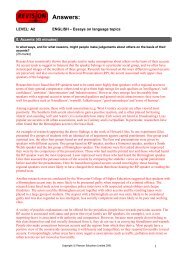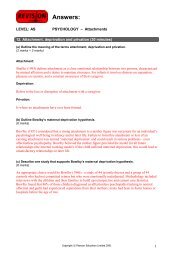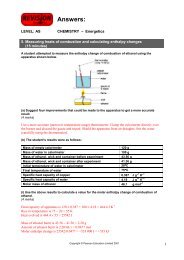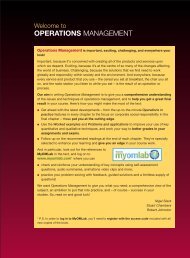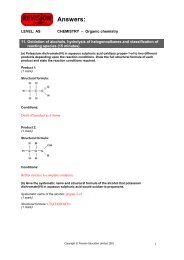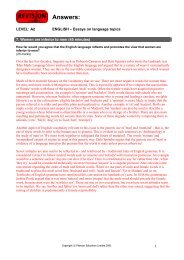The Dove Campaign for Real Beauty - Pearson
The Dove Campaign for Real Beauty - Pearson
The Dove Campaign for Real Beauty - Pearson
Create successful ePaper yourself
Turn your PDF publications into a flip-book with our unique Google optimized e-Paper software.
Part 1 Marketing nowCompanies are also developing programmes, workshops and seminars to teach managersabout important ethics issues and help them find the proper responses. <strong>The</strong>y hold ethics workshopsand seminars and set up ethics committees. Furthermore, many companies have appointedhigh-level ethics officers to champion ethics issues and to help resolve ethics problems andconcerns facing employees.PricewaterhouseCoopers (PwC) is a good example. In 1996, PwC established an ethics officeand comprehensive ethics programme, headed by a high-level chief ethics officer. <strong>The</strong> ethicsprogramme begins with a code of conduct, called ‘<strong>The</strong> Way We Do Business’. PwC employeeslearn about the code of conduct and about how to handle thorny ethics issues in a comprehensiveethics training programme, called ‘Navigating the Grey’. <strong>The</strong> programme also includes an ethicshelpline and regular communications at all levels. ‘It is obviously not enough to distribute adocument,’ says PwC’s CEO, Samuel DiPiazza. ‘Ethics is in everything we say and do.’ Last yearalone, the PwC training programme involved 40,000 employees, and the helpline received over1,000 calls from people asking <strong>for</strong> guidance in working through difficult ethics dilemmas. 44Still, compliance rules, written codes and ethics training programmes do not guarantee ethicalbehaviour. Ethics and social responsibility require a total corporate commitment. <strong>The</strong>y must be acomponent of the overall corporate culture. Ethics programmes or seminars <strong>for</strong> employees helpto imbue corporate ethics and codes of conduct among staff, while ethical and social audits maybe used to monitor and evaluate business conduct and to use the lessons to guide both policyand behaviour. In the final analysis, ‘ethical behaviour’ must be an integral part of the organisation,a way of life that is deeply ingrained in the collective corporate body.<strong>The</strong> future holds many challenges and opportunities <strong>for</strong> marketing managers. In this chapter,we have examined many important concepts involving marketing’s sweeping impact on individualconsumers, other businesses, our ecological environment and society as a whole.Companies that are able to create new customer value in a socially responsible way will have aworld to conquer.Sustainable marketing<strong>The</strong> concept of sustainable marketing holds that an organisation should meet the needs of itspresent consumers without compromising the ability of future generations to fulfil their ownneeds. Figure 2.4 shows how sustainable marketing and the marketing concept are linked by thedimension of time. <strong>The</strong> marketing concept recognises that organisations thrive from day to dayFigure 2.4 Sustainablemarketing<strong>The</strong> businessNowFutureCustomerNowFutureMarketing conceptSocietal marketingconceptStrategic planningconceptSustainablemarketing concept108



